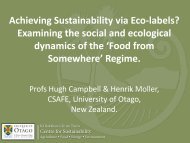Book of Abstract (incl. addendum) - IFSA symposium 2012
Book of Abstract (incl. addendum) - IFSA symposium 2012
Book of Abstract (incl. addendum) - IFSA symposium 2012
You also want an ePaper? Increase the reach of your titles
YUMPU automatically turns print PDFs into web optimized ePapers that Google loves.
Workshop 1.1 Knowledge flows in pluralistic research and advisory systems: how do advisors<br />
keep up-to-date and to what extent is their advice evidence-based?<br />
The aim <strong>of</strong> our paper is to apply the AKAP model toevaluate the impact <strong>of</strong> agricultural extension<br />
services on the Italian farms.To test the model, a questionnaire to a sample <strong>of</strong> Italian farms will be<br />
proposed: a set <strong>of</strong> questions is provided concerning each phase <strong>of</strong> the sequence. Differences in every<br />
step <strong>of</strong> the chain are expected, that we intend to connect with possible explicative variables, like farm<br />
socioeconomic characteristics and typology <strong>of</strong> territories involved. Besides, further information may<br />
originate from an in-depth analysis <strong>of</strong> the motivation for not consume agricultural extension services<br />
on behalf <strong>of</strong> farmers. The information so collected will be basis for final consideration and for defining<br />
possible future lines <strong>of</strong> actions under a normative perspective.<br />
Farmers’ trainers <strong>of</strong> Gourcy (Burkina Faso) facing the challenge <strong>of</strong><br />
adapting their services<br />
Patrice Djamen, Haouv Belem, Michel Havard and Elvis Tangen<br />
African Conservation Tillage Initiative (ACT), Kenya<br />
Patrice.Djamen@act-africa.org<br />
In Burkina Faso, the farmer to farmer extension approach (FTF) is emerging as an alternative for the<br />
improvement <strong>of</strong> agricultural advisory services in a context marked by the need to better take into<br />
account the diversity and transformation <strong>of</strong> farmers needs for support.<br />
The objective <strong>of</strong> this research was to assess the capacity <strong>of</strong> farmer’s trainers (FT) to adapt their<br />
interventions to their clients’ needs. Pr<strong>of</strong>ile and service <strong>of</strong>fer <strong>of</strong> 27 FT in the district <strong>of</strong> Gourcy<br />
(Burkina Faso) were characterized. Surveys were conducted to 70 producers on their assessment on the<br />
support they received from FT.<br />
FT are major producers, illiterate and with a good social status. Their service <strong>of</strong>fer consists in the<br />
training <strong>of</strong> other farmers on techniques <strong>of</strong> water and soil conservation, post harvests, production <strong>of</strong><br />
organic manure and agr<strong>of</strong>orestry. These topics are rarely determined by beneficiaries <strong>of</strong> FT services,<br />
but rather by support organizations (SO) <strong>incl</strong>uding research, NGOs and development projects who<br />
bring technical and financial backstopping to FT. SO consider FT as a means <strong>of</strong> rapid dissemination <strong>of</strong><br />
innovations, they don’t yet see FT as a channel to capture farmer’s demands. Producers appreciate<br />
positively services delivered by FT, but they also underline the poor capacity <strong>of</strong> FT to respond to their<br />
requests for new themes. FT are facing difficulty to adapt themselves their service <strong>of</strong>fer because <strong>of</strong><br />
their wait-and-see attitude, their low level <strong>of</strong> education, the unilateralism <strong>of</strong> their relations with SO and<br />
the unwillingness <strong>of</strong> their customers to pay for the services they seek.<br />
The FTF can contribute to make up the shortage <strong>of</strong> public advisory services only if SO and the<br />
State better recognize its potential and find means to facilitate capacity building and wider access <strong>of</strong> FT<br />
to knowledge. This raises the issue <strong>of</strong> the pr<strong>of</strong>ile, status and integration <strong>of</strong> FT in a pluralistic advisory<br />
framework.<br />
How the French cooperative Terrena identifies, tests and shares the EIF<br />
solutions with its members<br />
Bertrand Pinel<br />
TERRENA, cooperative Agricole, France<br />
Bpinel@terrena.fr<br />
Terrena (www.terrena.fr) is one <strong>of</strong> the major agricultural cooperatives in France, with 22000 farmers<br />
members, small as well as big farms. Approximately 300 technicians (crop and animal productions)<br />
give advice to the farmers. Besides, the cooperative is highly involved in the food industry (flour,<br />
cattle, pigs, poultry, milk, wine…). Thus, the Advisory Board has shown for a long time interest in the<br />
expectations <strong>of</strong> society towards farming, in particular the reduction <strong>of</strong> the use <strong>of</strong> non- renewable inputs.<br />
14











